Plano Words:
“angioplany” to “superplanetary”
Greek root elements: plano-, plan-, -plany, -plania (Greek: passively drifting, wandering, or roaming) with links to various planets and their Greek and Latin mythical backgrounds.
angioplany, angioplania:
The abnormal location, or displacement, of a blood vessel; also angiectopia.
aplanogamete:
A nonmotile, conjugating germ cell of various plants and animals.
diplanetism:
A condition whereby there are two periods of motility in one life history.
interplanetary:
Situated between the planets. Also, existing between planets or pertaining to travel between planets.
planet:
An astronomical body that orbits a star and does not shine with its own light, especially one of the nine such bodies orbiting the Sun in the solar system.
- While studying the sky, ancient astronomers observed that while most of the stars maintain fixed relative positions, there were a few heavenly bodies that obviously changed their positions in relation to each other and to the greater number of so-called fixed stars.
- The most obvious of these were the sun and the moon; but five others seemed to revolve around the Earth at different rates.
- These five (Mercury, Venus, Mars, Jupiter, and Saturn) were called by the Greeks asteres planetai (wandering stars) or planetai (wanderers).
- The Latin term used in place of the Greek was stellae errantes (wandering stars); but Late Latin borrowed the Greek term in the plural form, planetae, while the singular was planeta.
- By way of Old French, Middle English borrowed this word in the fourteenth century to give us the modern planet.
- Later, not only has the word become completely anglicized but three more planets were discovered: Uranus in the eighteenth century, Neptune in the nineteenth, and Pluto in the twentieth.
—Source of Information:
Webster’s Word Histories
(Springfield, Massachusetts: Merriam-Webster Inc., Publishers, 1989), p. 368.
A medical term for “a tree struck by blight” comes from an old belief that malignant aspects of the planets caused death and suffering on earth. When plants and animals died or fell ill for no apparent reason, they were said to be planet-struck. The term is first recorded in 1600.
—Source of Information: Encyclopedia of Word and Phrase Origins
by Robert Hendrickson (New York: Facts On File, Inc., 1997), p. 530.
planets:
Astronomical bodies that orbit a star and do not shine with their own light, especially the nine bodies orbiting the Sun in the solar system.
- The ancients were convinced that there were just seven planets including the: Sun, Moon, Mercury, Venus, Mars, Jupiter, and Saturn.
- It was also strongly believed that these planets were particularly important in the affairs of mankind.
- The astrological study of their positions among the stars at the moment of one’s birth was supposed to give information about his/her fate.
- The general character of a person was thought to be determined by which planet she/he was “born under” according to the calculations of astrologers, and such superstitions continue in modern times.
- Each of the seven planets was also believed to have a special influence over its designated day of the week: First day, Sol or the Sun; Second day, Luna or the Moon; Third day, Mars; Fourth day, Mercury; Fifth day, Jupiter; Sixth day, Venus; and the Seventh day, Saturn.
- The alchemists of the Middle Ages noted that there were seven planets and seven metals which were matched with the planets.
- The seven metals presented by the alchemists and matched with the planets include (in English): gold (Sun), silver (Moon), copper (Venus), iron (Mars), tin (Jupiter), lead (Saturn), and quicksilver (Mercury).
- Much more has been learned about the planets since 1977 because of the flights of Voyagers 1 and 2 (you may see a summary of the subject with a simple click).
Planets with and without Moons in their Orbital Orders from the Sun
- Mercury, no moon
- Venus, no moon
- Earth, one moon: Moon (Luna)
- Mars, two moons: Phobos and Deimos
- Jupiter, sixteen moons: Metis, Adrastea, Amalthea, Thebe, Io, Europa, Ganymede, Callisto, Leda, Himalia, Lysithea, Elara, Ananke, Carme, Pasiphae, and Sinope
- Saturn, eighteen moons: Atlas, Prometheus, Pandora, Epimetheus, Janus, Mimas Enceladus, Tethys, Telesto, Calypso, Dione, Helene, Rhea, Titan, Hyperion, Lapetus, Phoebe, and Pan
- Uranus, fifteen moons: Cordelia, Ophelia, Bianca, Cessida, Desdemona, Juliet, Portia, Rosalind, Belinda, Puck, Miranda, Ariel, Umbriel, Titania, and Oberon
- Neptune, eight moons: Naiad, Thalassa, Despina, Galatea, Larissa, Proteus, Triton, and Nereid
- Pluto, one moon: Charon

The planets are illustrated below and links are available for more details about their Greek and Latin myths, symbolisms, and scientific information.
Just click on the image of your choice for further details about each planet.
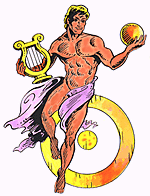
Apollo, the Sun god, and the center
of our solar-planetary system.
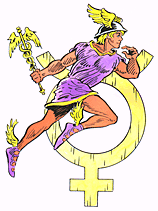
Mercury, messenger of the Roman gods
(first planet from the sun).
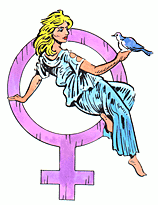
Venus, goddess of love and beauty, springtime,
and flowers (second planet from the sun).
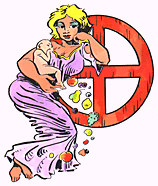
Gaea, Earth goddess (ancient Greeks thought of her
as Terra Mater) Earth Mother (third planet from the sun).
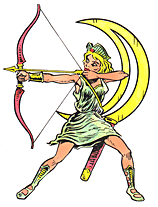
Diana, or Luna, Roman goddess of the Moon,
animals, and hunting (earth’s moon).
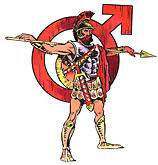
Mars, Roman god of war
(fourth planet from the sun).
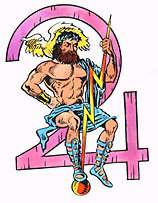
Jupiter, King of the Roman gods
(fifth planet from the sun).

Saturn, god of harvest or time of reaping
(sixth planet from the sun).
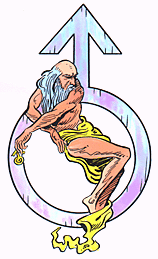
Uranus, father of Saturn and grandfather of Jupiter
(seventh planet the sun).
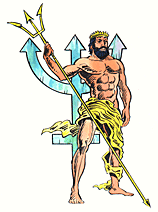
Neptune, Roman god of the sea
(eighth planet from the sun).
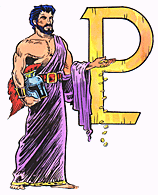
Pluto, Greek god of wealth, ruled the dark underworld
of myth (ninth planet from the sun).
planetarian:
1. Belonging to or connected with a planet or planets; planetary.
2. An astrologer.
3. An inhabitant of a planet.
planetarium:
1. A building usually with a domed ceiling onto which movable images of the stars, planets, and other objects seen in the night sky are projected for an audience.
2. A model of the solar system, often a working model showing how the planets revolve around the Sun.
planetarily:
After the manner of a planet; figuratively, with uncertain recurrence.
planetary:
1. Relating to, belonging to, involving, or typical of planets.
2. Involving or relating to the whole earth, all the people or countries of the world, or a large proportion of them.
planetesimal:
1. A small body that is the precursor of a planet in the early stages of solar system development, or the fragmented result of a cataclysmic collision between a planet and another celestial body.
2. A small rocky celestial object thought to have orbited the Sun in the early stages of the solar system before coalescing with others to form the planets.
3. A small solid body following a planetary orbit; a miniature planet.
planetical:
1. Of or pertaining to the planets; planetary.
2. Wandering, roving, vagrant.
planeticose:
Given to wandering.
planetography:
A description of the physical features of a planet.
planetoid, planetoidal:
1. A branch of astronomy that studies the origin and composition of the planets and other solid bodies in the solar system such as comets and meteors; asteroid.
2. A body resembling a planet; a name sometimes given to the minor planets or asteroids.
3. Of or belonging to the astroids.
planetolatry:
Idolatrous worship of the planets.
planetologist:
1. Someone who studies the planets including their origins and compositions.
2. An expert or specialist in planetology.
planetology:
A branch of astronomy dealing with planets and satellites, including their surface features, structures, chemical compositions, and atmospheres.
planisphere:
A circular star map drawn for a given latitude, having a rotating mask that shows which constellations are visible at any time and date in the year.
planoblast:
A free-swimming medusa form of hydroid individual.
planomania:
A morbid desire or impulse to roam or wander from home and to throw off the restraints of society.
planomenon:
All free-living organisms; those organisms not rooted or attached to a substratum.
planophrasia:
Wandering speech; usually used to refer to a flight of ideas in manic syndromes.
superplanetary:
Above the surface of a planet.
|